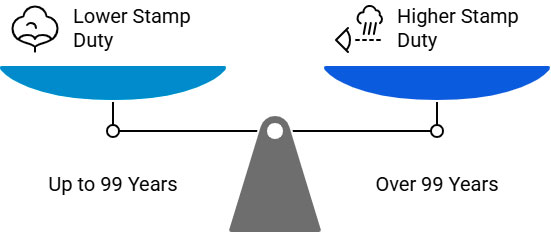Tamil Nadu Property Tax Guide: Calculate Stamp Duty, Registration Fees & GST Implications
- 2nd Apr 2025
- 1131
- 0

Never miss any update
Join our WhatsApp Channel
Purchasing property in Tamil Nadu involves understanding the significant costs of stamp duty and registration charges. As one of the states with the highest rates in India, being prepared for these expenses is crucial for property buyers. This comprehensive guide covers everything you need to know about Tamil Nadu's stamp duty structure, recent changes, calculation methods, and money-saving tips.
What is Stamp Duty and Why Does it Matter?
Stamp duty is a mandatory tax imposed by the state government during property transactions. In Tamil Nadu, these charges are governed by the Indian Stamps Act, 1899 and Tamil Nadu Stamp Act, 2019. The payment validates your ownership documents, making them legally enforceable.
Registration charges, paid alongside stamp duty, cover the cost of recording your property purchase in official government records, securing your legal ownership rights.
Current Stamp Duty and Registration Rates in Tamil Nadu (2025)
Tamil Nadu has some of the highest property transaction taxes in India. Here's the current structure:
| Category | Stamp Duty | Registration Charges |
|---|---|---|
| Male Buyers | 7% of property value | 4% of property value |
| Female Buyers | 7% of property value | 3% of property value (from April 1, 2025) |
| Joint Ownership | 7% of property value | 4% of property value |
New Benefit for Women Property Buyers
In a progressive move announced in March 2025, the Tamil Nadu government has reduced registration charges for women from 4% to 3%. This change, effective from April 1, 2025, applies to:
- Properties valued up to ₹10 lakh
- Includes houses, plots, and agricultural land
- Benefits approximately 75% of all property registrations
This initiative aims to promote women's financial independence and property ownership across the state.
Stamp Duty Rates for Different Document Types
The rates vary significantly based on the type of property document:
| Document Type | Stamp Duty | Registration Charges |
|---|---|---|
| Gift Deed | 7% of market value | 4% of market value |
| Property Exchange | 7% on greater value | 4% on greater value |
| Sale Deed | 7% of market value | 4% of market value |
| Simple Mortgage | 1% on loan amount (max ₹40,000) | 1% on loan amount (max ₹10,000) |
| Mortgage with Possession | 4% on loan amount | 1% on loan amount (max ₹2,00,000) |
| Sale Agreement | ₹20 | 1% on advance amount |
| Construction Agreement | 1% of construction value | 1% of construction value |
| Cancellation | ₹50 | ₹50 |
| Family Partition | 1% of market value (max ₹25,000 per share) | 1% (max ₹4,000 per share) |
| Non-family Partition | 4% of market value for separated shares | 1% of market value for separated shares |
| General Power of Attorney (POA) | ₹100 | ₹10,000 |
| Family POA | ₹100 | ₹1,000 |
| POA for movable property | ₹100 | ₹50 |
| POA with consideration | 4% on consideration | 1% on consideration (min ₹10,000) |
| Partnership deed (capital under ₹500) | ₹50 | 1% of invested capital |
| Other partnership deeds | ₹300 | 1% of invested capital |
Special Cases: Settlement and Release Deeds
Settlement Deed Registration
For settlement deeds in Tamil Nadu:
- Stamp duty: 1% of property's market value (maximum ₹25,000)
- Registration fees: 1% of property value (maximum ₹4,000)
- Required documents: Original title document, Patta, encumbrance certificate, identity proofs and Aadhaar of all parties
Release Deed Charges
- Family members: Stamp duty and registration fee of 1% of market value (maximum ₹25,000 for stamp duty and ₹4,000 for registration)
- Non-family members: Stamp duty of 7% and registration fee of 1%
Lease Deed Registration Costs
For standard lease agreements:
- Stamp duty: 1% (maximum ₹20,000)
- Registration charge: 1% based on rent amount
For long-term leases:
- Up to 99 years: 1% registration fee, 4% stamp duty
- Over 99 years: 1% registration fee, 7% stamp duty

How to Calculate Stamp Duty and Registration Charges
Example Calculation
Let's say you're purchasing a property in Chennai worth ₹50 lakh:
For a male buyer:
- Stamp duty: 7% of ₹50 lakh = ₹3,50,000
- Registration charges: 4% of ₹50 lakh = ₹2,00,000
- Total additional costs: ₹5,50,000
- Final property cost: ₹55,50,000
For a female buyer (after April 1, 2025):
- Stamp duty: 7% of ₹50 lakh = ₹3,50,000
- Registration charges: 3% of ₹50 lakh = ₹1,50,000
- Total additional costs: ₹5,00,000
- Final property cost: ₹55,00,000
This represents a savings of ₹50,000 for women buyers.
Payment Methods for Stamp Duty
Offline Payment Options
Visit your local sub-registrar's office with:
- Completed application form
- Payment via cash, cheque, demand draft, NEFT, RTGS, debit or credit card
- You can purchase stamp paper from a treasury or use the franking method
Online Payment Process
Tamil Nadu offers e-stamping through the Stock Holding Corporation of India Limited (SHCIL):
- Visit the SHCIL website (schilstamp.com)
- Select Tamil Nadu from the state list
- Log in and download the application form
- Visit your nearest SHCIL branch with the form
- Make payment using your preferred method
Tax Benefits on Stamp Duty Payments
The financial burden of stamp duty can be partially offset by tax benefits:
- Maximum tax deduction of ₹1,50,000
- Available to individuals and Hindu Undivided Families (HUFs)
- Consult with a tax professional to maximize your benefits
GST Implications on Property Registration
GST rates for residential properties in Tamil Nadu:
- Regular residential properties: 5% without Input Tax Credit (ITC)
- Affordable housing segment: 1% without ITC
- No GST on sale or resale of old properties
Affordable Housing Criteria in Tamil Nadu
To qualify for the 1% GST rate:
- Metropolitan regions: Maximum carpet area of 60 square meters
- Non-metropolitan regions: Maximum carpet area of 90 square meters
- Property value must not exceed ₹45 lakh regardless of location
Important Documents Required for Registration
Prepare these documents for a smooth registration process:
- Identity proof of property owner and all witnesses
- PAN Card of property owner
- Two passport-sized photographs
- No Objection Certificate
- Stamp Duty Receipt
- Power of Attorney (if applicable)
- Sale deed
- Municipal Tax Bills
Essential Timelines for Payment
Stamp duty should be paid within four months of property purchase with these penalty structures:
- Within one week: 25% of registration charge
- Between one week to one month: 75% of registration charge
- Between one month to four months: 100% of registration charge
Department Contact Information
For any queries regarding stamp duty and registration:
- Email: [email protected]
- Registered Office: 301, Center Point, Dr Babasaheb Ambedkar Road, Parel, Mumbai- 400 012
- e-Stamping Operations Office: SHCIL House, Plot No. P-51 T.T.C Industrial Area, MIDC, Mahape, Navi Mumbai - 400 710
Conclusion
Stamp duty and registration charges represent significant costs when buying property in Tamil Nadu. With stamp duty at 7% and registration charges at 3-4%, these expenses can add up to 11% of your property's value. The recent reduction in registration charges for women is a positive step toward increasing property ownership among women.
Understanding these costs beforehand, knowing the payment procedures, and being aware of potential tax benefits can help you plan your property purchase more effectively. Always consult with legal and financial experts to ensure compliance with current regulations and to maximize available benefits.
Frequently Asked Questions
1. When should I pay stamp duty in Tamil Nadu?
You must pay stamp duty within four months of property purchase, with increasing penalties after one week and one month.
2. Can I pay stamp duty online in Tamil Nadu?
Yes, you can pay online through the SHCIL website by downloading the application form and visiting their nearest branch.
3. How much is the stamp duty for women in Tamil Nadu?
Women pay 7% stamp duty and 3% registration charges (effective April 1, 2025) for properties up to ₹10 lakh.
4. Is e-stamp paper available in Tamil Nadu?
No, Tamil Nadu does not currently provide e-stamp paper; you must obtain Non-Judicial Stamp paper from the court or treasury.
5. What is the maximum tax benefit available on stamp duty payment?
The maximum tax deduction available is ₹1,50,000 for individuals and Hindu Undivided Families.
6. Do I need to pay GST on property registration in Tamil Nadu?
GST of 5% applies to regular residential properties and 1% for affordable housing, but not on sale or resale of old properties.
7. What happens if I don't pay stamp duty in Tamil Nadu?
Without paying stamp duty, you cannot claim legal property ownership, and your documents won't be valid in court.
8. Are there any special discounts for senior citizens on stamp duty?
Currently, Tamil Nadu doesn't offer special stamp duty discounts for senior citizens, only for women buyers.
For more information on property taxes and registration in other states, check out our guide on stamp duty and registration charges across India.

 Admin
Admin


Comments
No comments yet.
Add Your Comment
Thank you, for commenting !!
Your comment is under moderation...
Keep reading blogs